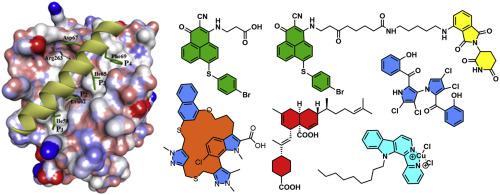European Journal of Medicinal Chemistry ( IF 6.0 ) Pub Date : 2020-11-24 , DOI: 10.1016/j.ejmech.2020.113038 Arvind Negi , Paul V. Murphy

|
The myeloid leukemia cell differentiation protein (Mcl-1) is an anti-apoptotic protein of the B-cell lymphoma 2 (Bcl-2) family, which regulates cellular apoptosis. Mcl-1 expression plays a key role in survival of cancer cells and therefore serves as a promising target in cancer therapy. Besides, its importance as a cancer target, various peptides and small-molecule inhibitors have been successfully designed and synthesized, yet no Mcl-1 inhibitor is approved for clinical use. However, recent development on the understanding of Mcl-1’s role in key cellular processes in cancer and an upsurge of reports highlighting its association in various anticancer drug resistance supports the view that Mcl-1 is a key target in various cancers, especially hematological cancers. This review compiles structures of a variety of inhibitors of Mcl-1 reported to date. These include inhibitors based on a diverse range of heterocycles (e.g. indole, imidazole, thiophene, nicotinic acid, piperazine, triazine, thiazole, isoindoline), oligomers (terphenyl, quaterpyridine), polyphenol, phenalene, anthranilic acid, anthraquinone, macrocycles, natural products, and metal-based complexes. In addition, an effort has been made to summarize the structure activity relationships, based on a variety of assays, of some important classes of Mcl-1 inhibitors, giving affinities and selectivities for Mcl-1 compared to other Bcl-2 family members. A focus has been placed on categorizing the inhibitors based on their core frameworks (scaffolds) to appeal to the chemical biologist or medicinal chemist.
中文翻译:

开发Mcl-1抑制剂用于癌症治疗
髓样白血病细胞分化蛋白(Mcl-1)是B细胞淋巴瘤2(Bcl-2)家族的抗凋亡蛋白,它调节细胞凋亡。Mcl-1表达在癌细胞的存活中起关键作用,因此成为癌症治疗中有希望的靶标。此外,已经成功设计并合成了其作为癌症靶标的重要性,各种肽和小分子抑制剂尚未被批准用于临床。然而,关于Mcl-1在癌症关键细胞过程中的作用的理解的最新发展以及强调其与各种抗癌药物抗性的报道的热潮支持了这样的观点,即Mcl-1是各种癌症,特别是血液学癌症的关键靶标。这篇综述汇编了迄今报道的多种Mcl-1抑制剂的结构。这些包括基于多种杂环的抑制剂(例如,吲哚,咪唑,噻吩,烟酸,哌嗪,三嗪,噻唑,异吲哚啉),低聚物(三联苯,四吡啶),多酚,苯,萘,邻氨基苯甲酸,蒽醌,大环化合物,天然产物以及金属基络合物。另外,基于各种测定,已经做出努力来总结一些重要类别的Mcl-1抑制剂的结构活性关系,与其他Bcl-2家族成员相比,给出了Mcl-1的亲和力和选择性。重点是根据抑制剂的核心框架(支架)对抑制剂进行分类,以吸引化学生物学家或药用化学家。三嗪,噻唑,异吲哚啉),低聚物(三联苯,四吡啶),多酚,菲,邻氨基苯甲酸,蒽醌,大环化合物,天然产物和金属基络合物。另外,基于各种测定,已经做出努力来总结一些重要类别的Mcl-1抑制剂的结构活性关系,与其他Bcl-2家族成员相比,给出了Mcl-1的亲和力和选择性。重点是根据抑制剂的核心框架(支架)对抑制剂进行分类,以吸引化学生物学家或药用化学家。三嗪,噻唑,异吲哚啉),低聚物(三联苯,四吡啶),多酚,菲,邻氨基苯甲酸,蒽醌,大环化合物,天然产物和金属基络合物。另外,基于各种测定,已经做出努力来总结一些重要类别的Mcl-1抑制剂的结构活性关系,与其他Bcl-2家族成员相比,给出了Mcl-1的亲和力和选择性。重点是根据抑制剂的核心框架(支架)对抑制剂进行分类,以吸引化学生物学家或药用化学家。基于各种测定,已经做出了一些努力来总结一些重要类别的Mcl-1抑制剂的结构活性关系,与其他Bcl-2家族成员相比,Mcl-1的亲和力和选择性更高。重点是根据抑制剂的核心框架(支架)对抑制剂进行分类,以吸引化学生物学家或药用化学家。基于各种测定,已经做出了一些努力来总结一些重要类别的Mcl-1抑制剂的结构活性关系,与其他Bcl-2家族成员相比,Mcl-1的亲和力和选择性更高。重点是根据抑制剂的核心框架(支架)对抑制剂进行分类,以吸引化学生物学家或药用化学家。











































 京公网安备 11010802027423号
京公网安备 11010802027423号